Organisational Behaviour Report: M&S and Employee Motivation
VerifiedAdded on 2023/06/08
|15
|4661
|83
Report
AI Summary
This report delves into the intricacies of organizational behaviour, using Mark & Spencer as a case study. It explores how organizational politics, culture, and power influence individual and team behaviour and performance. The report examines various aspects of organizational culture, including power, task, person, and role cultures, and their impact on employee motivation and productivity. It further discusses content and process motivational theories, such as Maslow's Hierarchy of Needs, Herzberg's Two-Factor Theory, Vroom's Expectancy Theory, Adam's Equity Theory, and Locke's Goal Setting Theory, and how these theories can be applied to enhance employee motivation. The report also evaluates the relationship between politics, culture, power, and motivation, highlighting the factors that contribute to effective teams and organizational success. Finally, it assesses the relevance of team development theories in relation to organizational behaviour, philosophies, and concepts that influence workplace behaviour, offering recommendations for fostering a positive and productive work environment.
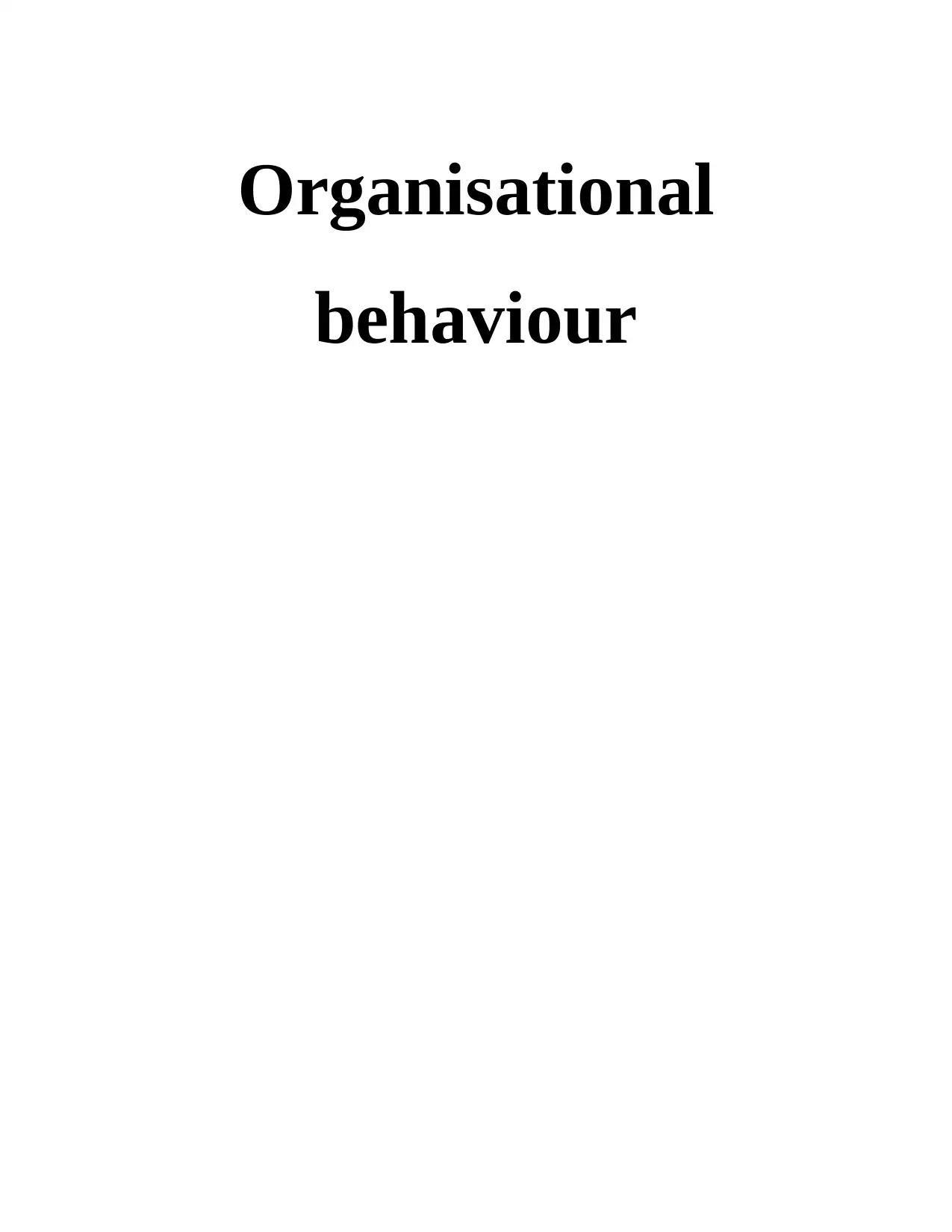
Organisational
behaviour
behaviour
Paraphrase This Document
Need a fresh take? Get an instant paraphrase of this document with our AI Paraphraser
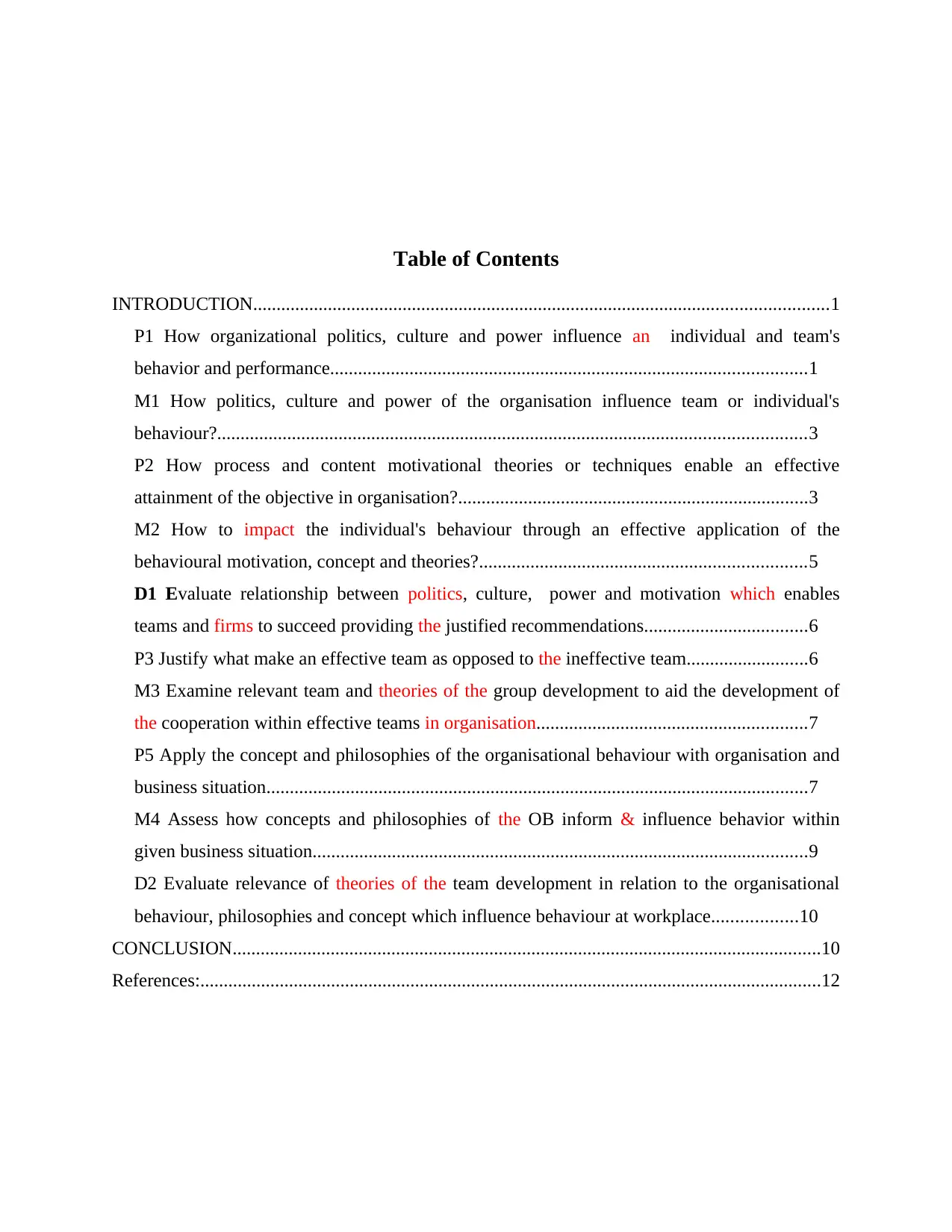
Table of Contents
INTRODUCTION...........................................................................................................................1
P1 How organizational politics, culture and power influence an individual and team's
behavior and performance......................................................................................................1
M1 How politics, culture and power of the organisation influence team or individual's
behaviour?..............................................................................................................................3
P2 How process and content motivational theories or techniques enable an effective
attainment of the objective in organisation?...........................................................................3
M2 How to impact the individual's behaviour through an effective application of the
behavioural motivation, concept and theories?......................................................................5
D1 Evaluate relationship between politics, culture, power and motivation which enables
teams and firms to succeed providing the justified recommendations...................................6
P3 Justify what make an effective team as opposed to the ineffective team..........................6
M3 Examine relevant team and theories of the group development to aid the development of
the cooperation within effective teams in organisation..........................................................7
P5 Apply the concept and philosophies of the organisational behaviour with organisation and
business situation....................................................................................................................7
M4 Assess how concepts and philosophies of the OB inform & influence behavior within
given business situation..........................................................................................................9
D2 Evaluate relevance of theories of the team development in relation to the organisational
behaviour, philosophies and concept which influence behaviour at workplace..................10
CONCLUSION..............................................................................................................................10
References:.....................................................................................................................................12
INTRODUCTION...........................................................................................................................1
P1 How organizational politics, culture and power influence an individual and team's
behavior and performance......................................................................................................1
M1 How politics, culture and power of the organisation influence team or individual's
behaviour?..............................................................................................................................3
P2 How process and content motivational theories or techniques enable an effective
attainment of the objective in organisation?...........................................................................3
M2 How to impact the individual's behaviour through an effective application of the
behavioural motivation, concept and theories?......................................................................5
D1 Evaluate relationship between politics, culture, power and motivation which enables
teams and firms to succeed providing the justified recommendations...................................6
P3 Justify what make an effective team as opposed to the ineffective team..........................6
M3 Examine relevant team and theories of the group development to aid the development of
the cooperation within effective teams in organisation..........................................................7
P5 Apply the concept and philosophies of the organisational behaviour with organisation and
business situation....................................................................................................................7
M4 Assess how concepts and philosophies of the OB inform & influence behavior within
given business situation..........................................................................................................9
D2 Evaluate relevance of theories of the team development in relation to the organisational
behaviour, philosophies and concept which influence behaviour at workplace..................10
CONCLUSION..............................................................................................................................10
References:.....................................................................................................................................12
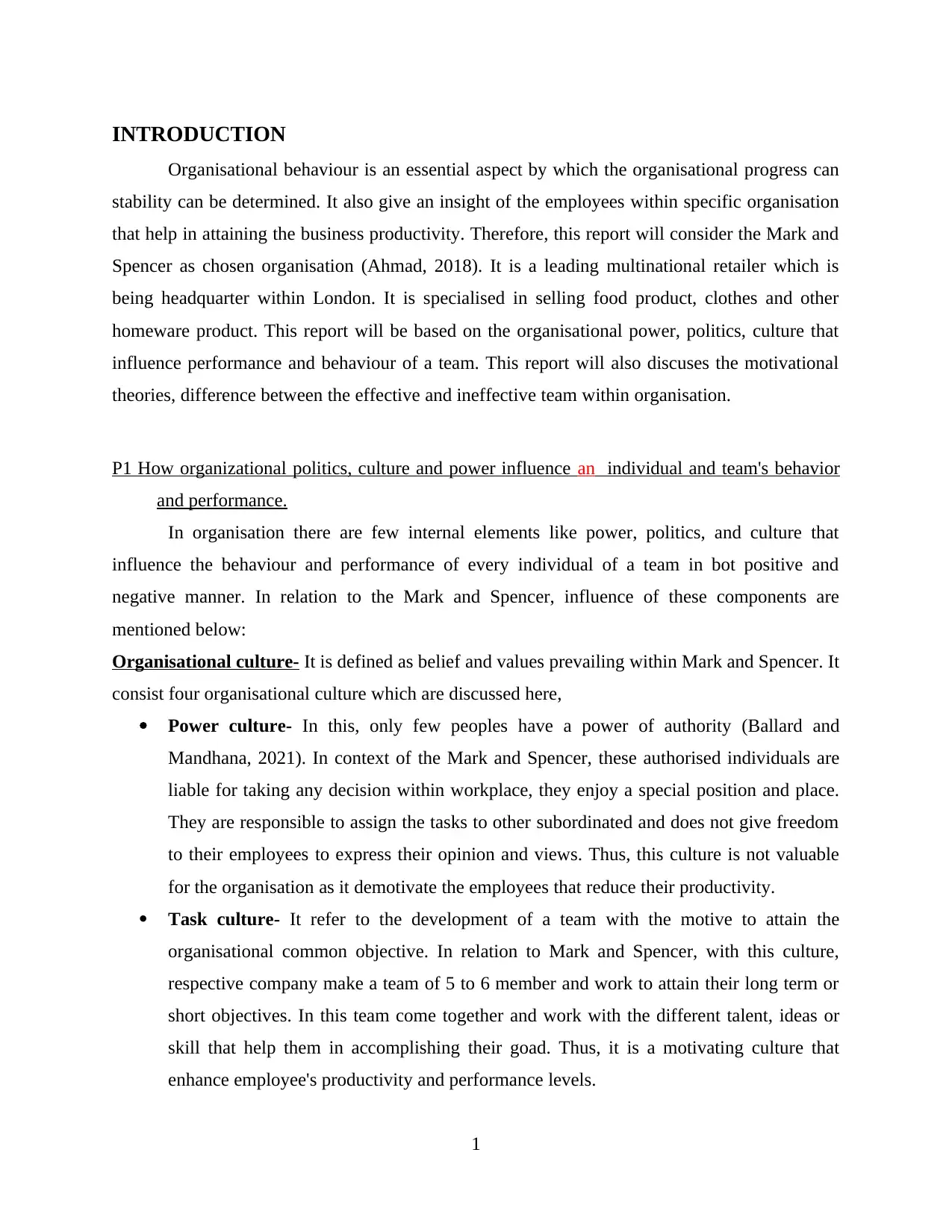
INTRODUCTION
Organisational behaviour is an essential aspect by which the organisational progress can
stability can be determined. It also give an insight of the employees within specific organisation
that help in attaining the business productivity. Therefore, this report will consider the Mark and
Spencer as chosen organisation (Ahmad, 2018). It is a leading multinational retailer which is
being headquarter within London. It is specialised in selling food product, clothes and other
homeware product. This report will be based on the organisational power, politics, culture that
influence performance and behaviour of a team. This report will also discuses the motivational
theories, difference between the effective and ineffective team within organisation.
P1 How organizational politics, culture and power influence an individual and team's behavior
and performance.
In organisation there are few internal elements like power, politics, and culture that
influence the behaviour and performance of every individual of a team in bot positive and
negative manner. In relation to the Mark and Spencer, influence of these components are
mentioned below:
Organisational culture- It is defined as belief and values prevailing within Mark and Spencer. It
consist four organisational culture which are discussed here,
Power culture- In this, only few peoples have a power of authority (Ballard and
Mandhana, 2021). In context of the Mark and Spencer, these authorised individuals are
liable for taking any decision within workplace, they enjoy a special position and place.
They are responsible to assign the tasks to other subordinated and does not give freedom
to their employees to express their opinion and views. Thus, this culture is not valuable
for the organisation as it demotivate the employees that reduce their productivity.
Task culture- It refer to the development of a team with the motive to attain the
organisational common objective. In relation to Mark and Spencer, with this culture,
respective company make a team of 5 to 6 member and work to attain their long term or
short objectives. In this team come together and work with the different talent, ideas or
skill that help them in accomplishing their goad. Thus, it is a motivating culture that
enhance employee's productivity and performance levels.
1
Organisational behaviour is an essential aspect by which the organisational progress can
stability can be determined. It also give an insight of the employees within specific organisation
that help in attaining the business productivity. Therefore, this report will consider the Mark and
Spencer as chosen organisation (Ahmad, 2018). It is a leading multinational retailer which is
being headquarter within London. It is specialised in selling food product, clothes and other
homeware product. This report will be based on the organisational power, politics, culture that
influence performance and behaviour of a team. This report will also discuses the motivational
theories, difference between the effective and ineffective team within organisation.
P1 How organizational politics, culture and power influence an individual and team's behavior
and performance.
In organisation there are few internal elements like power, politics, and culture that
influence the behaviour and performance of every individual of a team in bot positive and
negative manner. In relation to the Mark and Spencer, influence of these components are
mentioned below:
Organisational culture- It is defined as belief and values prevailing within Mark and Spencer. It
consist four organisational culture which are discussed here,
Power culture- In this, only few peoples have a power of authority (Ballard and
Mandhana, 2021). In context of the Mark and Spencer, these authorised individuals are
liable for taking any decision within workplace, they enjoy a special position and place.
They are responsible to assign the tasks to other subordinated and does not give freedom
to their employees to express their opinion and views. Thus, this culture is not valuable
for the organisation as it demotivate the employees that reduce their productivity.
Task culture- It refer to the development of a team with the motive to attain the
organisational common objective. In relation to Mark and Spencer, with this culture,
respective company make a team of 5 to 6 member and work to attain their long term or
short objectives. In this team come together and work with the different talent, ideas or
skill that help them in accomplishing their goad. Thus, it is a motivating culture that
enhance employee's productivity and performance levels.
1
⊘ This is a preview!⊘
Do you want full access?
Subscribe today to unlock all pages.

Trusted by 1+ million students worldwide
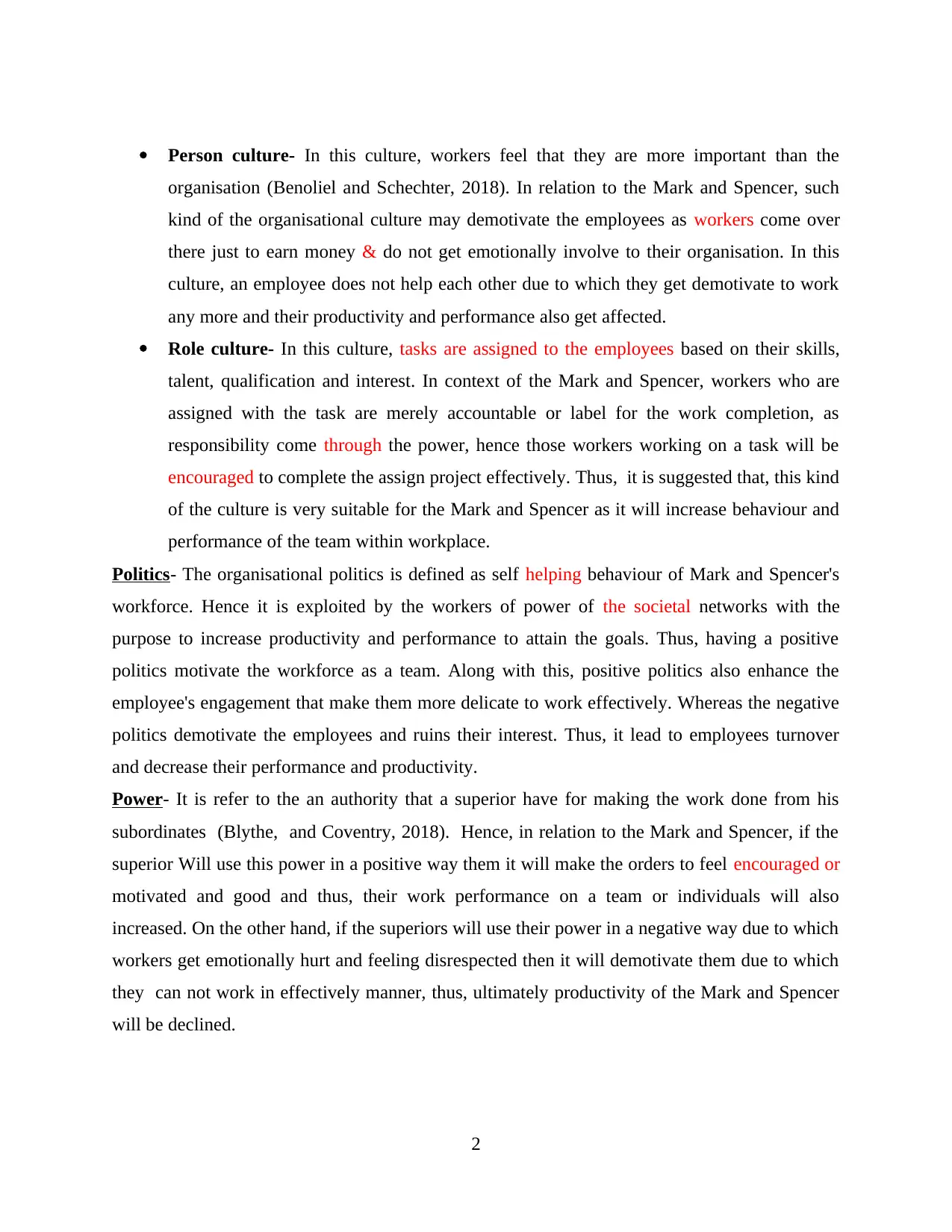
Person culture- In this culture, workers feel that they are more important than the
organisation (Benoliel and Schechter, 2018). In relation to the Mark and Spencer, such
kind of the organisational culture may demotivate the employees as workers come over
there just to earn money & do not get emotionally involve to their organisation. In this
culture, an employee does not help each other due to which they get demotivate to work
any more and their productivity and performance also get affected.
Role culture- In this culture, tasks are assigned to the employees based on their skills,
talent, qualification and interest. In context of the Mark and Spencer, workers who are
assigned with the task are merely accountable or label for the work completion, as
responsibility come through the power, hence those workers working on a task will be
encouraged to complete the assign project effectively. Thus, it is suggested that, this kind
of the culture is very suitable for the Mark and Spencer as it will increase behaviour and
performance of the team within workplace.
Politics- The organisational politics is defined as self helping behaviour of Mark and Spencer's
workforce. Hence it is exploited by the workers of power of the societal networks with the
purpose to increase productivity and performance to attain the goals. Thus, having a positive
politics motivate the workforce as a team. Along with this, positive politics also enhance the
employee's engagement that make them more delicate to work effectively. Whereas the negative
politics demotivate the employees and ruins their interest. Thus, it lead to employees turnover
and decrease their performance and productivity.
Power- It is refer to the an authority that a superior have for making the work done from his
subordinates (Blythe, and Coventry, 2018). Hence, in relation to the Mark and Spencer, if the
superior Will use this power in a positive way them it will make the orders to feel encouraged or
motivated and good and thus, their work performance on a team or individuals will also
increased. On the other hand, if the superiors will use their power in a negative way due to which
workers get emotionally hurt and feeling disrespected then it will demotivate them due to which
they can not work in effectively manner, thus, ultimately productivity of the Mark and Spencer
will be declined.
2
organisation (Benoliel and Schechter, 2018). In relation to the Mark and Spencer, such
kind of the organisational culture may demotivate the employees as workers come over
there just to earn money & do not get emotionally involve to their organisation. In this
culture, an employee does not help each other due to which they get demotivate to work
any more and their productivity and performance also get affected.
Role culture- In this culture, tasks are assigned to the employees based on their skills,
talent, qualification and interest. In context of the Mark and Spencer, workers who are
assigned with the task are merely accountable or label for the work completion, as
responsibility come through the power, hence those workers working on a task will be
encouraged to complete the assign project effectively. Thus, it is suggested that, this kind
of the culture is very suitable for the Mark and Spencer as it will increase behaviour and
performance of the team within workplace.
Politics- The organisational politics is defined as self helping behaviour of Mark and Spencer's
workforce. Hence it is exploited by the workers of power of the societal networks with the
purpose to increase productivity and performance to attain the goals. Thus, having a positive
politics motivate the workforce as a team. Along with this, positive politics also enhance the
employee's engagement that make them more delicate to work effectively. Whereas the negative
politics demotivate the employees and ruins their interest. Thus, it lead to employees turnover
and decrease their performance and productivity.
Power- It is refer to the an authority that a superior have for making the work done from his
subordinates (Blythe, and Coventry, 2018). Hence, in relation to the Mark and Spencer, if the
superior Will use this power in a positive way them it will make the orders to feel encouraged or
motivated and good and thus, their work performance on a team or individuals will also
increased. On the other hand, if the superiors will use their power in a negative way due to which
workers get emotionally hurt and feeling disrespected then it will demotivate them due to which
they can not work in effectively manner, thus, ultimately productivity of the Mark and Spencer
will be declined.
2
Paraphrase This Document
Need a fresh take? Get an instant paraphrase of this document with our AI Paraphraser
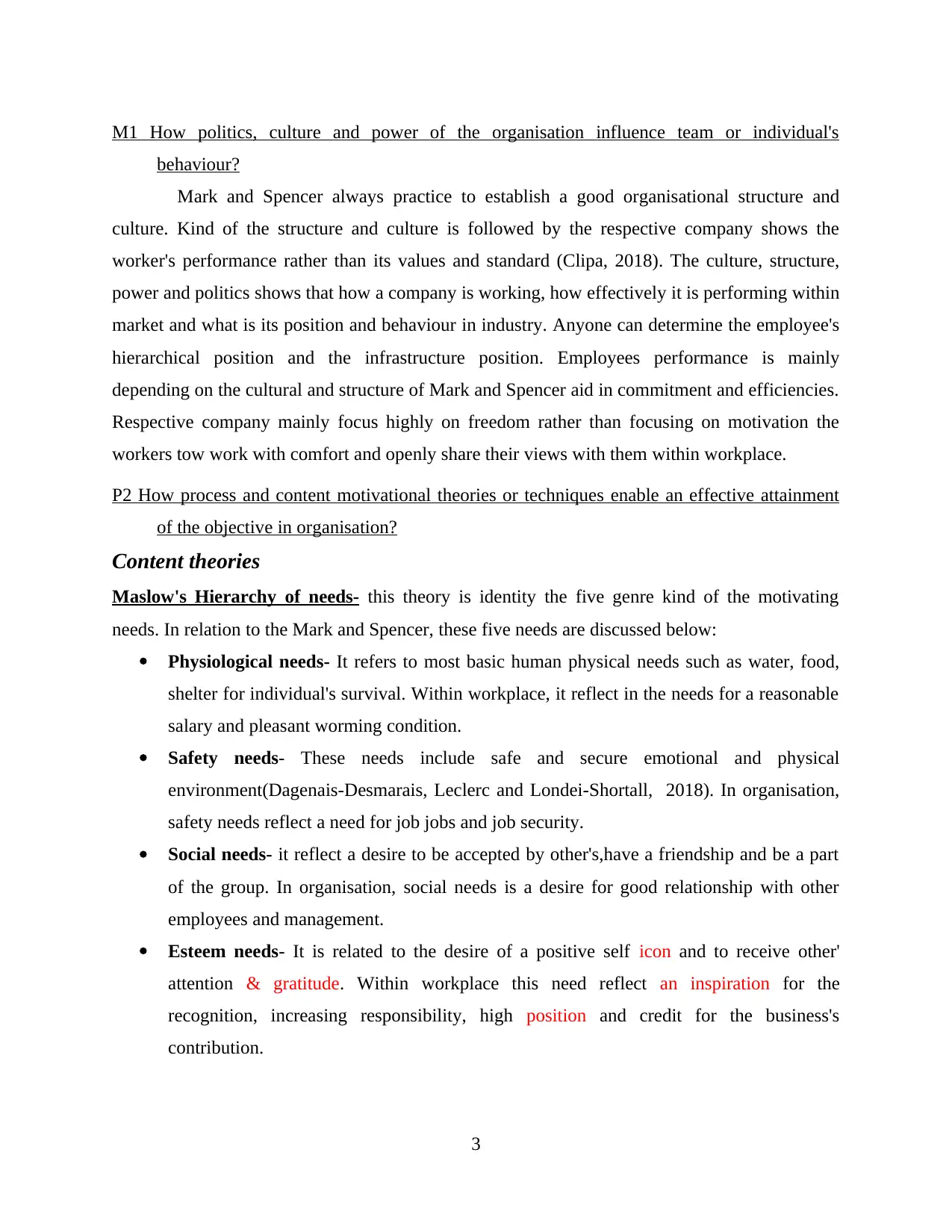
M1 How politics, culture and power of the organisation influence team or individual's
behaviour?
Mark and Spencer always practice to establish a good organisational structure and
culture. Kind of the structure and culture is followed by the respective company shows the
worker's performance rather than its values and standard (Clipa, 2018). The culture, structure,
power and politics shows that how a company is working, how effectively it is performing within
market and what is its position and behaviour in industry. Anyone can determine the employee's
hierarchical position and the infrastructure position. Employees performance is mainly
depending on the cultural and structure of Mark and Spencer aid in commitment and efficiencies.
Respective company mainly focus highly on freedom rather than focusing on motivation the
workers tow work with comfort and openly share their views with them within workplace.
P2 How process and content motivational theories or techniques enable an effective attainment
of the objective in organisation?
Content theories
Maslow's Hierarchy of needs- this theory is identity the five genre kind of the motivating
needs. In relation to the Mark and Spencer, these five needs are discussed below:
Physiological needs- It refers to most basic human physical needs such as water, food,
shelter for individual's survival. Within workplace, it reflect in the needs for a reasonable
salary and pleasant worming condition.
Safety needs- These needs include safe and secure emotional and physical
environment(Dagenais-Desmarais, Leclerc and Londei-Shortall, 2018). In organisation,
safety needs reflect a need for job jobs and job security.
Social needs- it reflect a desire to be accepted by other's,have a friendship and be a part
of the group. In organisation, social needs is a desire for good relationship with other
employees and management.
Esteem needs- It is related to the desire of a positive self icon and to receive other'
attention & gratitude. Within workplace this need reflect an inspiration for the
recognition, increasing responsibility, high position and credit for the business's
contribution.
3
behaviour?
Mark and Spencer always practice to establish a good organisational structure and
culture. Kind of the structure and culture is followed by the respective company shows the
worker's performance rather than its values and standard (Clipa, 2018). The culture, structure,
power and politics shows that how a company is working, how effectively it is performing within
market and what is its position and behaviour in industry. Anyone can determine the employee's
hierarchical position and the infrastructure position. Employees performance is mainly
depending on the cultural and structure of Mark and Spencer aid in commitment and efficiencies.
Respective company mainly focus highly on freedom rather than focusing on motivation the
workers tow work with comfort and openly share their views with them within workplace.
P2 How process and content motivational theories or techniques enable an effective attainment
of the objective in organisation?
Content theories
Maslow's Hierarchy of needs- this theory is identity the five genre kind of the motivating
needs. In relation to the Mark and Spencer, these five needs are discussed below:
Physiological needs- It refers to most basic human physical needs such as water, food,
shelter for individual's survival. Within workplace, it reflect in the needs for a reasonable
salary and pleasant worming condition.
Safety needs- These needs include safe and secure emotional and physical
environment(Dagenais-Desmarais, Leclerc and Londei-Shortall, 2018). In organisation,
safety needs reflect a need for job jobs and job security.
Social needs- it reflect a desire to be accepted by other's,have a friendship and be a part
of the group. In organisation, social needs is a desire for good relationship with other
employees and management.
Esteem needs- It is related to the desire of a positive self icon and to receive other'
attention & gratitude. Within workplace this need reflect an inspiration for the
recognition, increasing responsibility, high position and credit for the business's
contribution.
3
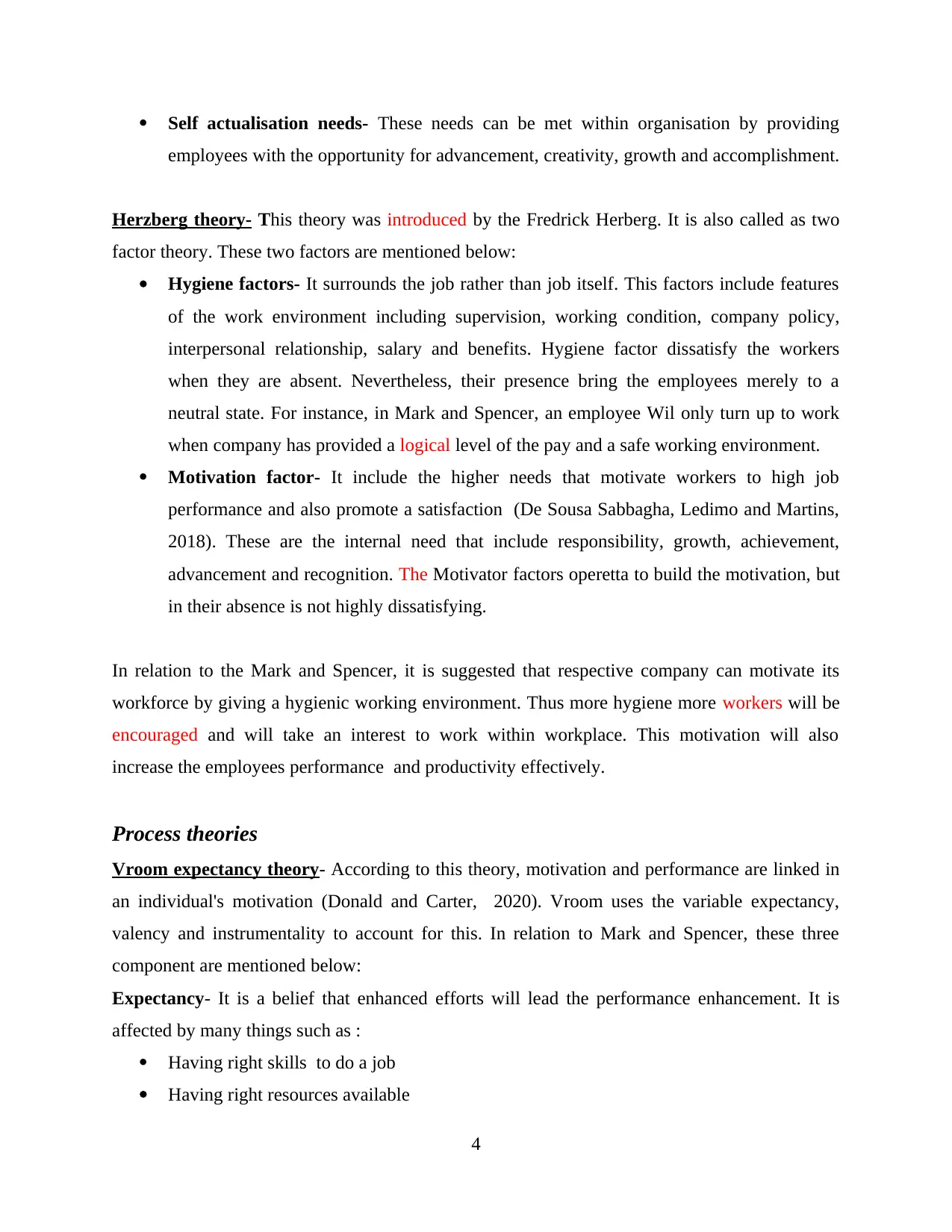
Self actualisation needs- These needs can be met within organisation by providing
employees with the opportunity for advancement, creativity, growth and accomplishment.
Herzberg theory- This theory was introduced by the Fredrick Herberg. It is also called as two
factor theory. These two factors are mentioned below:
Hygiene factors- It surrounds the job rather than job itself. This factors include features
of the work environment including supervision, working condition, company policy,
interpersonal relationship, salary and benefits. Hygiene factor dissatisfy the workers
when they are absent. Nevertheless, their presence bring the employees merely to a
neutral state. For instance, in Mark and Spencer, an employee Wil only turn up to work
when company has provided a logical level of the pay and a safe working environment.
Motivation factor- It include the higher needs that motivate workers to high job
performance and also promote a satisfaction (De Sousa Sabbagha, Ledimo and Martins,
2018). These are the internal need that include responsibility, growth, achievement,
advancement and recognition. The Motivator factors operetta to build the motivation, but
in their absence is not highly dissatisfying.
In relation to the Mark and Spencer, it is suggested that respective company can motivate its
workforce by giving a hygienic working environment. Thus more hygiene more workers will be
encouraged and will take an interest to work within workplace. This motivation will also
increase the employees performance and productivity effectively.
Process theories
Vroom expectancy theory- According to this theory, motivation and performance are linked in
an individual's motivation (Donald and Carter, 2020). Vroom uses the variable expectancy,
valency and instrumentality to account for this. In relation to Mark and Spencer, these three
component are mentioned below:
Expectancy- It is a belief that enhanced efforts will lead the performance enhancement. It is
affected by many things such as :
Having right skills to do a job
Having right resources available
4
employees with the opportunity for advancement, creativity, growth and accomplishment.
Herzberg theory- This theory was introduced by the Fredrick Herberg. It is also called as two
factor theory. These two factors are mentioned below:
Hygiene factors- It surrounds the job rather than job itself. This factors include features
of the work environment including supervision, working condition, company policy,
interpersonal relationship, salary and benefits. Hygiene factor dissatisfy the workers
when they are absent. Nevertheless, their presence bring the employees merely to a
neutral state. For instance, in Mark and Spencer, an employee Wil only turn up to work
when company has provided a logical level of the pay and a safe working environment.
Motivation factor- It include the higher needs that motivate workers to high job
performance and also promote a satisfaction (De Sousa Sabbagha, Ledimo and Martins,
2018). These are the internal need that include responsibility, growth, achievement,
advancement and recognition. The Motivator factors operetta to build the motivation, but
in their absence is not highly dissatisfying.
In relation to the Mark and Spencer, it is suggested that respective company can motivate its
workforce by giving a hygienic working environment. Thus more hygiene more workers will be
encouraged and will take an interest to work within workplace. This motivation will also
increase the employees performance and productivity effectively.
Process theories
Vroom expectancy theory- According to this theory, motivation and performance are linked in
an individual's motivation (Donald and Carter, 2020). Vroom uses the variable expectancy,
valency and instrumentality to account for this. In relation to Mark and Spencer, these three
component are mentioned below:
Expectancy- It is a belief that enhanced efforts will lead the performance enhancement. It is
affected by many things such as :
Having right skills to do a job
Having right resources available
4
⊘ This is a preview!⊘
Do you want full access?
Subscribe today to unlock all pages.

Trusted by 1+ million students worldwide
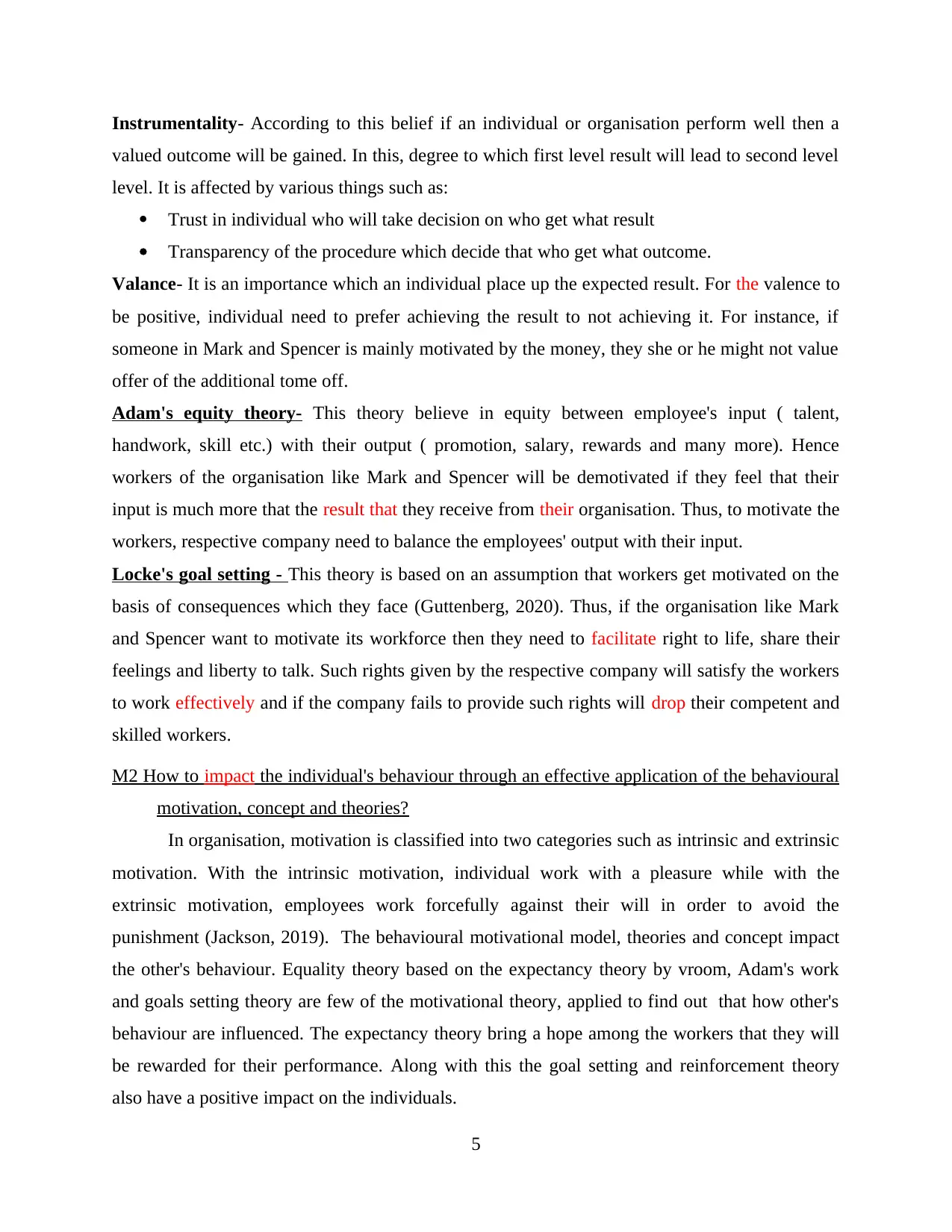
Instrumentality- According to this belief if an individual or organisation perform well then a
valued outcome will be gained. In this, degree to which first level result will lead to second level
level. It is affected by various things such as:
Trust in individual who will take decision on who get what result
Transparency of the procedure which decide that who get what outcome.
Valance- It is an importance which an individual place up the expected result. For the valence to
be positive, individual need to prefer achieving the result to not achieving it. For instance, if
someone in Mark and Spencer is mainly motivated by the money, they she or he might not value
offer of the additional tome off.
Adam's equity theory- This theory believe in equity between employee's input ( talent,
handwork, skill etc.) with their output ( promotion, salary, rewards and many more). Hence
workers of the organisation like Mark and Spencer will be demotivated if they feel that their
input is much more that the result that they receive from their organisation. Thus, to motivate the
workers, respective company need to balance the employees' output with their input.
Locke's goal setting - This theory is based on an assumption that workers get motivated on the
basis of consequences which they face (Guttenberg, 2020). Thus, if the organisation like Mark
and Spencer want to motivate its workforce then they need to facilitate right to life, share their
feelings and liberty to talk. Such rights given by the respective company will satisfy the workers
to work effectively and if the company fails to provide such rights will drop their competent and
skilled workers.
M2 How to impact the individual's behaviour through an effective application of the behavioural
motivation, concept and theories?
In organisation, motivation is classified into two categories such as intrinsic and extrinsic
motivation. With the intrinsic motivation, individual work with a pleasure while with the
extrinsic motivation, employees work forcefully against their will in order to avoid the
punishment (Jackson, 2019). The behavioural motivational model, theories and concept impact
the other's behaviour. Equality theory based on the expectancy theory by vroom, Adam's work
and goals setting theory are few of the motivational theory, applied to find out that how other's
behaviour are influenced. The expectancy theory bring a hope among the workers that they will
be rewarded for their performance. Along with this the goal setting and reinforcement theory
also have a positive impact on the individuals.
5
valued outcome will be gained. In this, degree to which first level result will lead to second level
level. It is affected by various things such as:
Trust in individual who will take decision on who get what result
Transparency of the procedure which decide that who get what outcome.
Valance- It is an importance which an individual place up the expected result. For the valence to
be positive, individual need to prefer achieving the result to not achieving it. For instance, if
someone in Mark and Spencer is mainly motivated by the money, they she or he might not value
offer of the additional tome off.
Adam's equity theory- This theory believe in equity between employee's input ( talent,
handwork, skill etc.) with their output ( promotion, salary, rewards and many more). Hence
workers of the organisation like Mark and Spencer will be demotivated if they feel that their
input is much more that the result that they receive from their organisation. Thus, to motivate the
workers, respective company need to balance the employees' output with their input.
Locke's goal setting - This theory is based on an assumption that workers get motivated on the
basis of consequences which they face (Guttenberg, 2020). Thus, if the organisation like Mark
and Spencer want to motivate its workforce then they need to facilitate right to life, share their
feelings and liberty to talk. Such rights given by the respective company will satisfy the workers
to work effectively and if the company fails to provide such rights will drop their competent and
skilled workers.
M2 How to impact the individual's behaviour through an effective application of the behavioural
motivation, concept and theories?
In organisation, motivation is classified into two categories such as intrinsic and extrinsic
motivation. With the intrinsic motivation, individual work with a pleasure while with the
extrinsic motivation, employees work forcefully against their will in order to avoid the
punishment (Jackson, 2019). The behavioural motivational model, theories and concept impact
the other's behaviour. Equality theory based on the expectancy theory by vroom, Adam's work
and goals setting theory are few of the motivational theory, applied to find out that how other's
behaviour are influenced. The expectancy theory bring a hope among the workers that they will
be rewarded for their performance. Along with this the goal setting and reinforcement theory
also have a positive impact on the individuals.
5
Paraphrase This Document
Need a fresh take? Get an instant paraphrase of this document with our AI Paraphraser
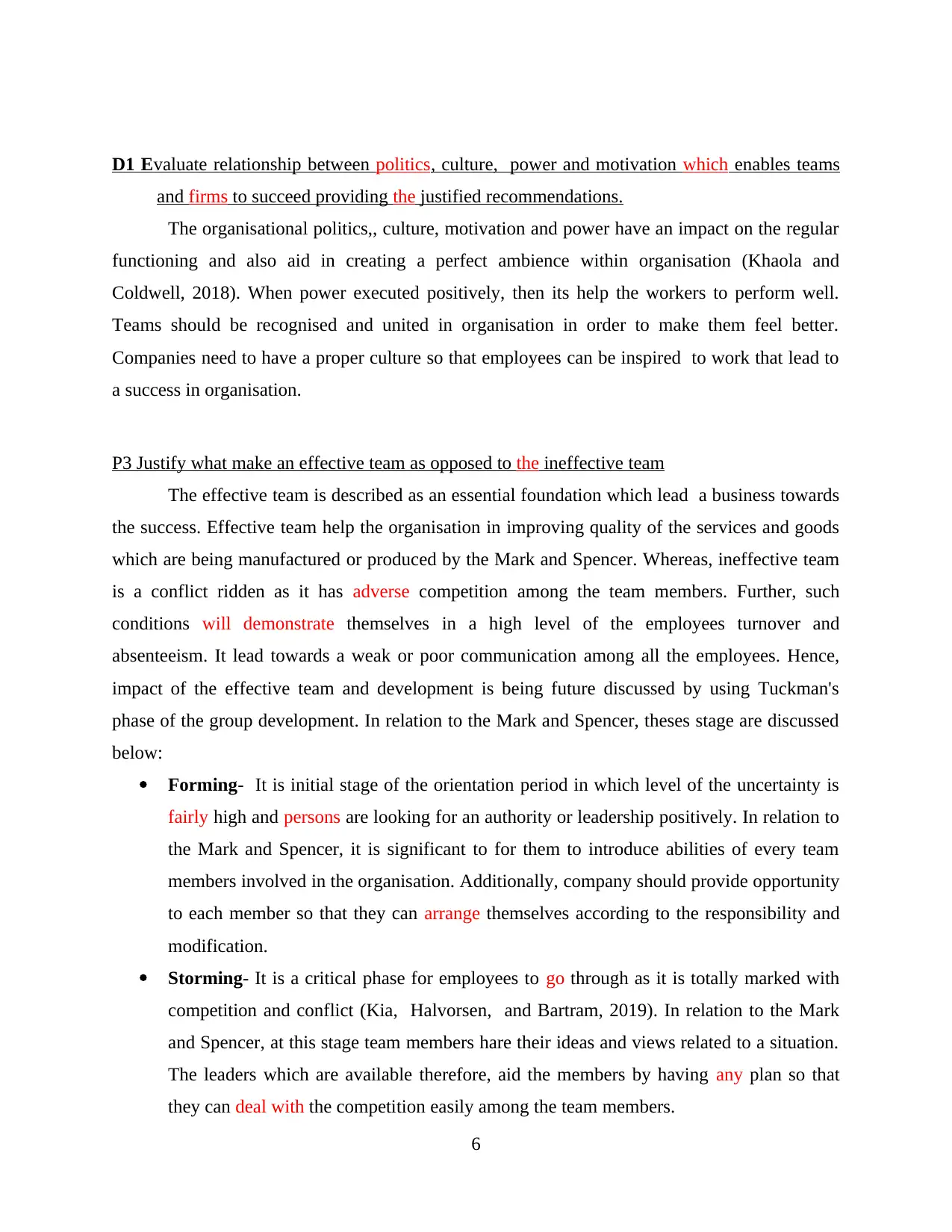
D1 Evaluate relationship between politics, culture, power and motivation which enables teams
and firms to succeed providing the justified recommendations.
The organisational politics,, culture, motivation and power have an impact on the regular
functioning and also aid in creating a perfect ambience within organisation (Khaola and
Coldwell, 2018). When power executed positively, then its help the workers to perform well.
Teams should be recognised and united in organisation in order to make them feel better.
Companies need to have a proper culture so that employees can be inspired to work that lead to
a success in organisation.
P3 Justify what make an effective team as opposed to the ineffective team
The effective team is described as an essential foundation which lead a business towards
the success. Effective team help the organisation in improving quality of the services and goods
which are being manufactured or produced by the Mark and Spencer. Whereas, ineffective team
is a conflict ridden as it has adverse competition among the team members. Further, such
conditions will demonstrate themselves in a high level of the employees turnover and
absenteeism. It lead towards a weak or poor communication among all the employees. Hence,
impact of the effective team and development is being future discussed by using Tuckman's
phase of the group development. In relation to the Mark and Spencer, theses stage are discussed
below:
Forming- It is initial stage of the orientation period in which level of the uncertainty is
fairly high and persons are looking for an authority or leadership positively. In relation to
the Mark and Spencer, it is significant to for them to introduce abilities of every team
members involved in the organisation. Additionally, company should provide opportunity
to each member so that they can arrange themselves according to the responsibility and
modification.
Storming- It is a critical phase for employees to go through as it is totally marked with
competition and conflict (Kia, Halvorsen, and Bartram, 2019). In relation to the Mark
and Spencer, at this stage team members hare their ideas and views related to a situation.
The leaders which are available therefore, aid the members by having any plan so that
they can deal with the competition easily among the team members.
6
and firms to succeed providing the justified recommendations.
The organisational politics,, culture, motivation and power have an impact on the regular
functioning and also aid in creating a perfect ambience within organisation (Khaola and
Coldwell, 2018). When power executed positively, then its help the workers to perform well.
Teams should be recognised and united in organisation in order to make them feel better.
Companies need to have a proper culture so that employees can be inspired to work that lead to
a success in organisation.
P3 Justify what make an effective team as opposed to the ineffective team
The effective team is described as an essential foundation which lead a business towards
the success. Effective team help the organisation in improving quality of the services and goods
which are being manufactured or produced by the Mark and Spencer. Whereas, ineffective team
is a conflict ridden as it has adverse competition among the team members. Further, such
conditions will demonstrate themselves in a high level of the employees turnover and
absenteeism. It lead towards a weak or poor communication among all the employees. Hence,
impact of the effective team and development is being future discussed by using Tuckman's
phase of the group development. In relation to the Mark and Spencer, theses stage are discussed
below:
Forming- It is initial stage of the orientation period in which level of the uncertainty is
fairly high and persons are looking for an authority or leadership positively. In relation to
the Mark and Spencer, it is significant to for them to introduce abilities of every team
members involved in the organisation. Additionally, company should provide opportunity
to each member so that they can arrange themselves according to the responsibility and
modification.
Storming- It is a critical phase for employees to go through as it is totally marked with
competition and conflict (Kia, Halvorsen, and Bartram, 2019). In relation to the Mark
and Spencer, at this stage team members hare their ideas and views related to a situation.
The leaders which are available therefore, aid the members by having any plan so that
they can deal with the competition easily among the team members.
6
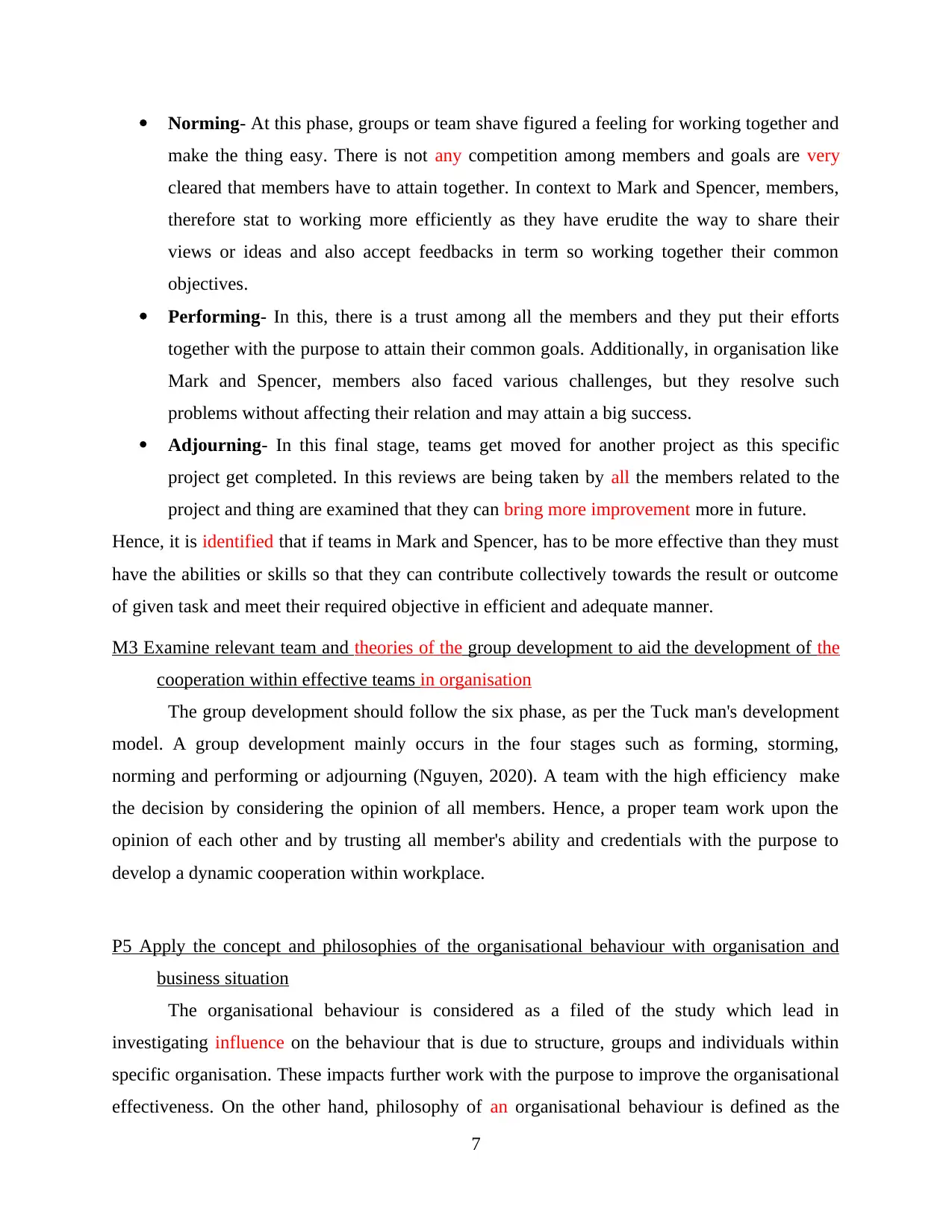
Norming- At this phase, groups or team shave figured a feeling for working together and
make the thing easy. There is not any competition among members and goals are very
cleared that members have to attain together. In context to Mark and Spencer, members,
therefore stat to working more efficiently as they have erudite the way to share their
views or ideas and also accept feedbacks in term so working together their common
objectives.
Performing- In this, there is a trust among all the members and they put their efforts
together with the purpose to attain their common goals. Additionally, in organisation like
Mark and Spencer, members also faced various challenges, but they resolve such
problems without affecting their relation and may attain a big success.
Adjourning- In this final stage, teams get moved for another project as this specific
project get completed. In this reviews are being taken by all the members related to the
project and thing are examined that they can bring more improvement more in future.
Hence, it is identified that if teams in Mark and Spencer, has to be more effective than they must
have the abilities or skills so that they can contribute collectively towards the result or outcome
of given task and meet their required objective in efficient and adequate manner.
M3 Examine relevant team and theories of the group development to aid the development of the
cooperation within effective teams in organisation
The group development should follow the six phase, as per the Tuck man's development
model. A group development mainly occurs in the four stages such as forming, storming,
norming and performing or adjourning (Nguyen, 2020). A team with the high efficiency make
the decision by considering the opinion of all members. Hence, a proper team work upon the
opinion of each other and by trusting all member's ability and credentials with the purpose to
develop a dynamic cooperation within workplace.
P5 Apply the concept and philosophies of the organisational behaviour with organisation and
business situation
The organisational behaviour is considered as a filed of the study which lead in
investigating influence on the behaviour that is due to structure, groups and individuals within
specific organisation. These impacts further work with the purpose to improve the organisational
effectiveness. On the other hand, philosophy of an organisational behaviour is defined as the
7
make the thing easy. There is not any competition among members and goals are very
cleared that members have to attain together. In context to Mark and Spencer, members,
therefore stat to working more efficiently as they have erudite the way to share their
views or ideas and also accept feedbacks in term so working together their common
objectives.
Performing- In this, there is a trust among all the members and they put their efforts
together with the purpose to attain their common goals. Additionally, in organisation like
Mark and Spencer, members also faced various challenges, but they resolve such
problems without affecting their relation and may attain a big success.
Adjourning- In this final stage, teams get moved for another project as this specific
project get completed. In this reviews are being taken by all the members related to the
project and thing are examined that they can bring more improvement more in future.
Hence, it is identified that if teams in Mark and Spencer, has to be more effective than they must
have the abilities or skills so that they can contribute collectively towards the result or outcome
of given task and meet their required objective in efficient and adequate manner.
M3 Examine relevant team and theories of the group development to aid the development of the
cooperation within effective teams in organisation
The group development should follow the six phase, as per the Tuck man's development
model. A group development mainly occurs in the four stages such as forming, storming,
norming and performing or adjourning (Nguyen, 2020). A team with the high efficiency make
the decision by considering the opinion of all members. Hence, a proper team work upon the
opinion of each other and by trusting all member's ability and credentials with the purpose to
develop a dynamic cooperation within workplace.
P5 Apply the concept and philosophies of the organisational behaviour with organisation and
business situation
The organisational behaviour is considered as a filed of the study which lead in
investigating influence on the behaviour that is due to structure, groups and individuals within
specific organisation. These impacts further work with the purpose to improve the organisational
effectiveness. On the other hand, philosophy of an organisational behaviour is defined as the
7
⊘ This is a preview!⊘
Do you want full access?
Subscribe today to unlock all pages.

Trusted by 1+ million students worldwide
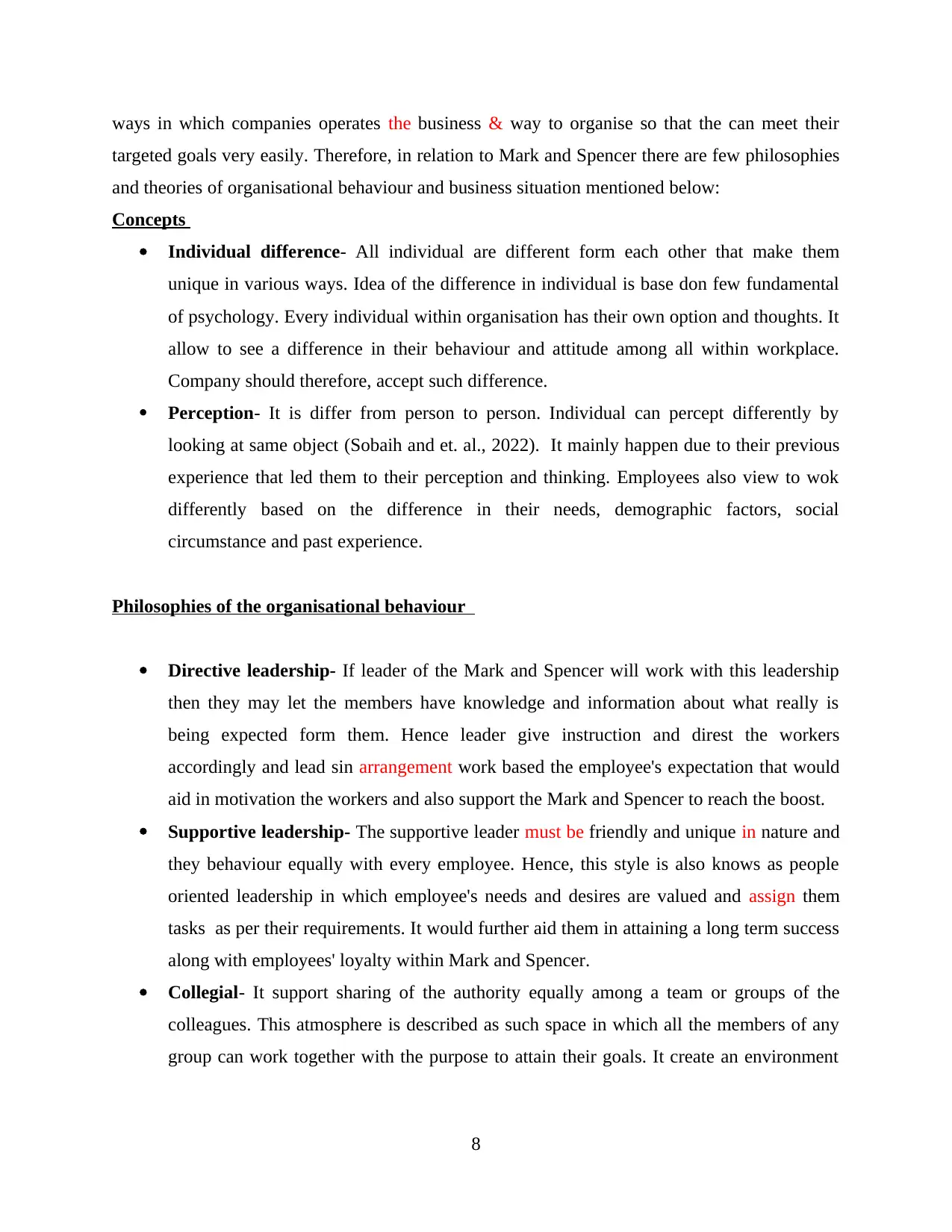
ways in which companies operates the business & way to organise so that the can meet their
targeted goals very easily. Therefore, in relation to Mark and Spencer there are few philosophies
and theories of organisational behaviour and business situation mentioned below:
Concepts
Individual difference- All individual are different form each other that make them
unique in various ways. Idea of the difference in individual is base don few fundamental
of psychology. Every individual within organisation has their own option and thoughts. It
allow to see a difference in their behaviour and attitude among all within workplace.
Company should therefore, accept such difference.
Perception- It is differ from person to person. Individual can percept differently by
looking at same object (Sobaih and et. al., 2022). It mainly happen due to their previous
experience that led them to their perception and thinking. Employees also view to wok
differently based on the difference in their needs, demographic factors, social
circumstance and past experience.
Philosophies of the organisational behaviour
Directive leadership- If leader of the Mark and Spencer will work with this leadership
then they may let the members have knowledge and information about what really is
being expected form them. Hence leader give instruction and direst the workers
accordingly and lead sin arrangement work based the employee's expectation that would
aid in motivation the workers and also support the Mark and Spencer to reach the boost.
Supportive leadership- The supportive leader must be friendly and unique in nature and
they behaviour equally with every employee. Hence, this style is also knows as people
oriented leadership in which employee's needs and desires are valued and assign them
tasks as per their requirements. It would further aid them in attaining a long term success
along with employees' loyalty within Mark and Spencer.
Collegial- It support sharing of the authority equally among a team or groups of the
colleagues. This atmosphere is described as such space in which all the members of any
group can work together with the purpose to attain their goals. It create an environment
8
targeted goals very easily. Therefore, in relation to Mark and Spencer there are few philosophies
and theories of organisational behaviour and business situation mentioned below:
Concepts
Individual difference- All individual are different form each other that make them
unique in various ways. Idea of the difference in individual is base don few fundamental
of psychology. Every individual within organisation has their own option and thoughts. It
allow to see a difference in their behaviour and attitude among all within workplace.
Company should therefore, accept such difference.
Perception- It is differ from person to person. Individual can percept differently by
looking at same object (Sobaih and et. al., 2022). It mainly happen due to their previous
experience that led them to their perception and thinking. Employees also view to wok
differently based on the difference in their needs, demographic factors, social
circumstance and past experience.
Philosophies of the organisational behaviour
Directive leadership- If leader of the Mark and Spencer will work with this leadership
then they may let the members have knowledge and information about what really is
being expected form them. Hence leader give instruction and direst the workers
accordingly and lead sin arrangement work based the employee's expectation that would
aid in motivation the workers and also support the Mark and Spencer to reach the boost.
Supportive leadership- The supportive leader must be friendly and unique in nature and
they behaviour equally with every employee. Hence, this style is also knows as people
oriented leadership in which employee's needs and desires are valued and assign them
tasks as per their requirements. It would further aid them in attaining a long term success
along with employees' loyalty within Mark and Spencer.
Collegial- It support sharing of the authority equally among a team or groups of the
colleagues. This atmosphere is described as such space in which all the members of any
group can work together with the purpose to attain their goals. It create an environment
8
Paraphrase This Document
Need a fresh take? Get an instant paraphrase of this document with our AI Paraphraser
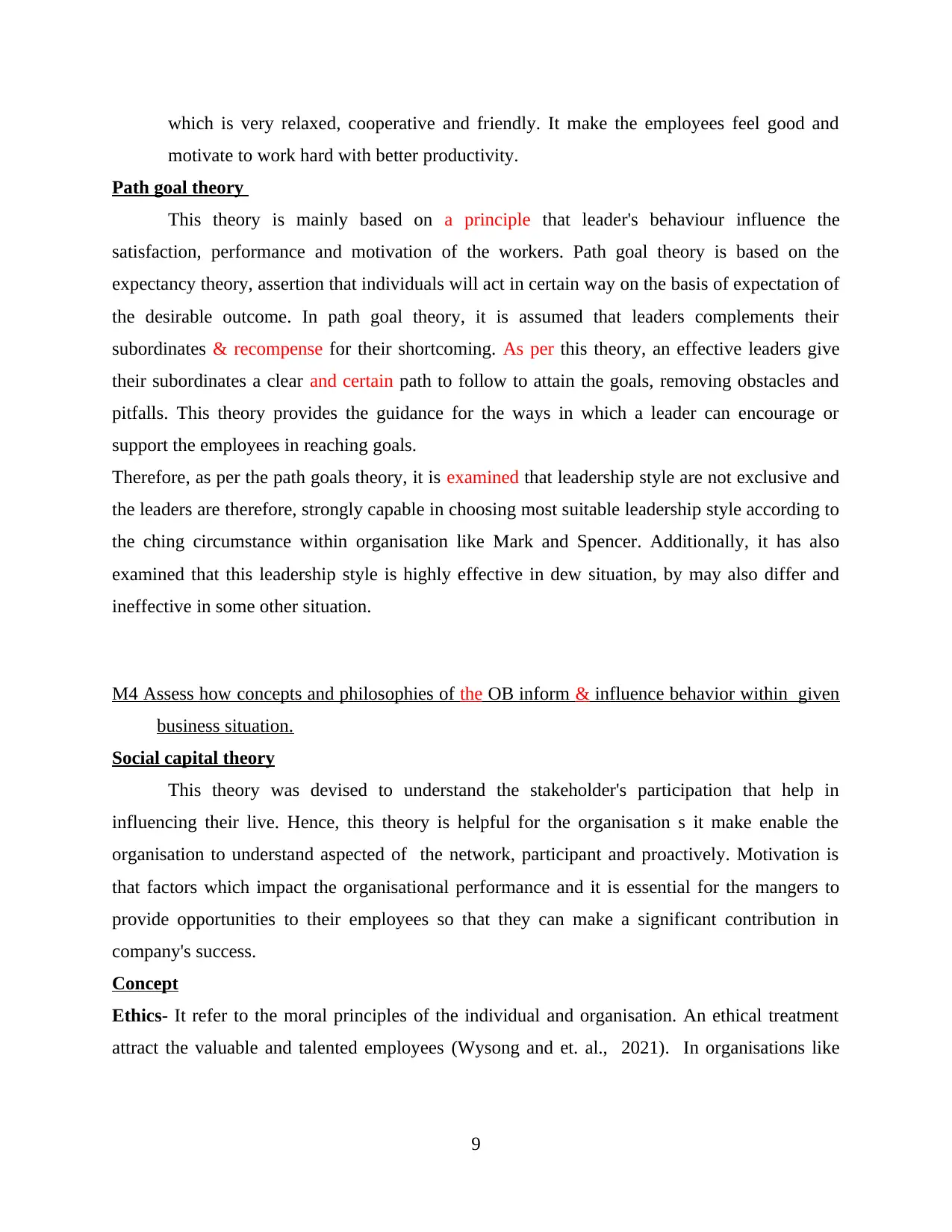
which is very relaxed, cooperative and friendly. It make the employees feel good and
motivate to work hard with better productivity.
Path goal theory
This theory is mainly based on a principle that leader's behaviour influence the
satisfaction, performance and motivation of the workers. Path goal theory is based on the
expectancy theory, assertion that individuals will act in certain way on the basis of expectation of
the desirable outcome. In path goal theory, it is assumed that leaders complements their
subordinates & recompense for their shortcoming. As per this theory, an effective leaders give
their subordinates a clear and certain path to follow to attain the goals, removing obstacles and
pitfalls. This theory provides the guidance for the ways in which a leader can encourage or
support the employees in reaching goals.
Therefore, as per the path goals theory, it is examined that leadership style are not exclusive and
the leaders are therefore, strongly capable in choosing most suitable leadership style according to
the ching circumstance within organisation like Mark and Spencer. Additionally, it has also
examined that this leadership style is highly effective in dew situation, by may also differ and
ineffective in some other situation.
M4 Assess how concepts and philosophies of the OB inform & influence behavior within given
business situation.
Social capital theory
This theory was devised to understand the stakeholder's participation that help in
influencing their live. Hence, this theory is helpful for the organisation s it make enable the
organisation to understand aspected of the network, participant and proactively. Motivation is
that factors which impact the organisational performance and it is essential for the mangers to
provide opportunities to their employees so that they can make a significant contribution in
company's success.
Concept
Ethics- It refer to the moral principles of the individual and organisation. An ethical treatment
attract the valuable and talented employees (Wysong and et. al., 2021). In organisations like
9
motivate to work hard with better productivity.
Path goal theory
This theory is mainly based on a principle that leader's behaviour influence the
satisfaction, performance and motivation of the workers. Path goal theory is based on the
expectancy theory, assertion that individuals will act in certain way on the basis of expectation of
the desirable outcome. In path goal theory, it is assumed that leaders complements their
subordinates & recompense for their shortcoming. As per this theory, an effective leaders give
their subordinates a clear and certain path to follow to attain the goals, removing obstacles and
pitfalls. This theory provides the guidance for the ways in which a leader can encourage or
support the employees in reaching goals.
Therefore, as per the path goals theory, it is examined that leadership style are not exclusive and
the leaders are therefore, strongly capable in choosing most suitable leadership style according to
the ching circumstance within organisation like Mark and Spencer. Additionally, it has also
examined that this leadership style is highly effective in dew situation, by may also differ and
ineffective in some other situation.
M4 Assess how concepts and philosophies of the OB inform & influence behavior within given
business situation.
Social capital theory
This theory was devised to understand the stakeholder's participation that help in
influencing their live. Hence, this theory is helpful for the organisation s it make enable the
organisation to understand aspected of the network, participant and proactively. Motivation is
that factors which impact the organisational performance and it is essential for the mangers to
provide opportunities to their employees so that they can make a significant contribution in
company's success.
Concept
Ethics- It refer to the moral principles of the individual and organisation. An ethical treatment
attract the valuable and talented employees (Wysong and et. al., 2021). In organisations like
9
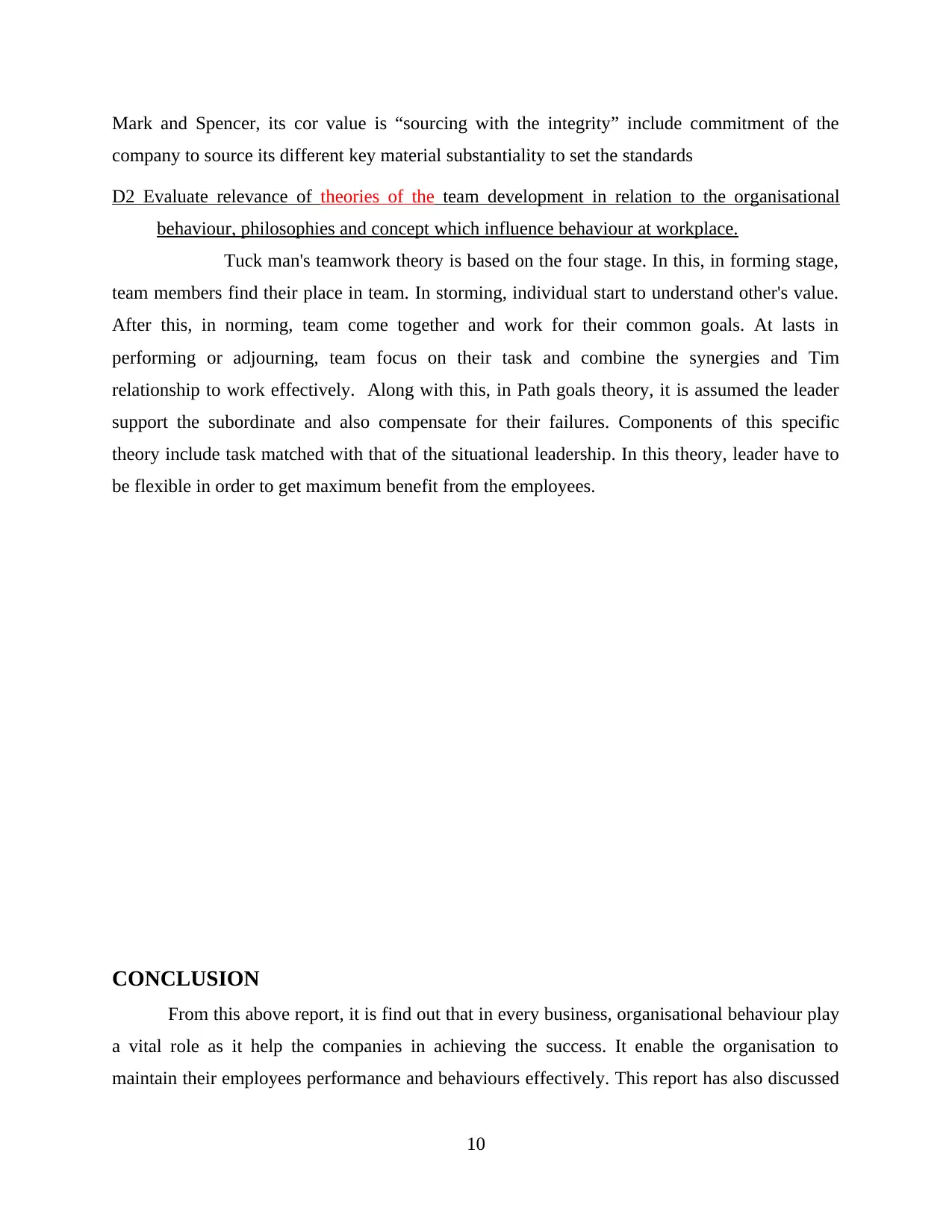
Mark and Spencer, its cor value is “sourcing with the integrity” include commitment of the
company to source its different key material substantiality to set the standards
D2 Evaluate relevance of theories of the team development in relation to the organisational
behaviour, philosophies and concept which influence behaviour at workplace.
Tuck man's teamwork theory is based on the four stage. In this, in forming stage,
team members find their place in team. In storming, individual start to understand other's value.
After this, in norming, team come together and work for their common goals. At lasts in
performing or adjourning, team focus on their task and combine the synergies and Tim
relationship to work effectively. Along with this, in Path goals theory, it is assumed the leader
support the subordinate and also compensate for their failures. Components of this specific
theory include task matched with that of the situational leadership. In this theory, leader have to
be flexible in order to get maximum benefit from the employees.
CONCLUSION
From this above report, it is find out that in every business, organisational behaviour play
a vital role as it help the companies in achieving the success. It enable the organisation to
maintain their employees performance and behaviours effectively. This report has also discussed
10
company to source its different key material substantiality to set the standards
D2 Evaluate relevance of theories of the team development in relation to the organisational
behaviour, philosophies and concept which influence behaviour at workplace.
Tuck man's teamwork theory is based on the four stage. In this, in forming stage,
team members find their place in team. In storming, individual start to understand other's value.
After this, in norming, team come together and work for their common goals. At lasts in
performing or adjourning, team focus on their task and combine the synergies and Tim
relationship to work effectively. Along with this, in Path goals theory, it is assumed the leader
support the subordinate and also compensate for their failures. Components of this specific
theory include task matched with that of the situational leadership. In this theory, leader have to
be flexible in order to get maximum benefit from the employees.
CONCLUSION
From this above report, it is find out that in every business, organisational behaviour play
a vital role as it help the companies in achieving the success. It enable the organisation to
maintain their employees performance and behaviours effectively. This report has also discussed
10
⊘ This is a preview!⊘
Do you want full access?
Subscribe today to unlock all pages.

Trusted by 1+ million students worldwide
1 out of 15
Related Documents
Your All-in-One AI-Powered Toolkit for Academic Success.
+13062052269
info@desklib.com
Available 24*7 on WhatsApp / Email
![[object Object]](/_next/static/media/star-bottom.7253800d.svg)
Unlock your academic potential
Copyright © 2020–2026 A2Z Services. All Rights Reserved. Developed and managed by ZUCOL.



